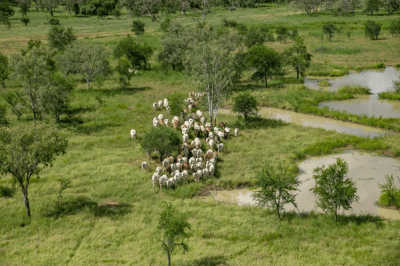WHEN customers buy beef from Queensland, they are buying a deforestation-free product – that is the good-news message from agriculture, says the State’s peak farm body AgForce.
Australia’s State of the Forests Report 2018 shows steady forest growth during the previous five-year period and the 2019 National Greenhouse Gas Inventory Report shows growth of approximately 160,000 hectares since 2008.
 Data from Queensland’s Statewide Landcover and Trees Study (SLATS) and Department of Resources also shows there is no significant clearing of trees in Queensland.
Data from Queensland’s Statewide Landcover and Trees Study (SLATS) and Department of Resources also shows there is no significant clearing of trees in Queensland.
According to the Food and Agriculture Organization (FAO) of the United Nations, Australia is second in a list of top 10 nations for reforestation, with an average net gain in forest area between 2010-2020 of 446,000 hectares each year.
Analysis of currently available data has found that the extent of vegetative cover and vegetation density in Queensland are both increasing, and that high ecological value areas are protected.
AgForce CEO Michael Guerin said that with so much at stake these days – environmentally, climatically, socially, and economically – this latest information told an undeniably good and positive story.
“This is fantastic news for everyone in Queensland, but especially for landholders who we know manage the land sustainably,” Mr Guerin said.
“They value protected plant and animal species, and they are united in their desire to produce safe, delicious, healthy food for the rest of us in Australia and throughout the world.
“The other good news is that agricultural land, with its diverse range of vegetation, essentially acts as “carbon sinks” because most landholders sequester more carbon on their properties than they release.”
Mr Guerin said claims by some that Queensland is a “deforestation hotspot” were false and based on outdated, incorrectly verified science.
He said the State of the Forests Report 2018 showed most clearing in Australia, including in Queensland, was of regrowth, and did not include permanent conversion of “remnant forest” into grazing lands.
“Control of regrowth is vital to help trees and grasses in Queensland regenerate, and critical to maintaining grazing lands and our current food production capability – including for crops and pulses,” Mr Guerin said.
“Sensational claims of land clearing the size of football fields are myths and by our estimations would take at least 250 years to achieve.
“Queensland’s world-class monitoring and compliance framework is able to identify cases of illegal clearing from satellite imagery updated every five days – which helps keep unexplained clearing to levels less than 0.04 per cent.
“Some groups like to take these satellite images and apply their own “facts” to them, twisting the truth and perpetuating myths to satisfy their own agendas.
“I’d like to suggest, however, that the last thing on the minds of these people is the health of the planet.”
Source: AgForce
